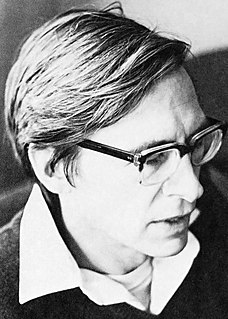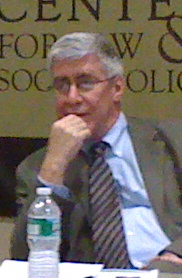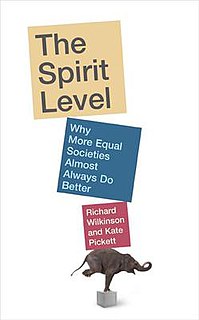Egalitarianism, or equalitarianism, is a school of thought within political philosophy that builds from the concept of social equality, prioritizing it for all people. Egalitarian doctrines are generally characterized by the idea that all humans are equal in fundamental worth or moral status. Egalitarianism is the doctrine that all citizens of a state should be accorded exactly equal rights.
Meritocracy is a political system in which economic goods and/or political power are vested in individual people on the basis of talent, effort, and achievement, rather than wealth or social class. Advancement in such a system is based on performance, as measured through examination or demonstrated achievement. Although the concept of meritocracy has existed for centuries, the term itself was coined in 1958 by the sociologist Michael Dunlop Young in his dystopian political and satirical book The Rise of the Meritocracy.

John Bordley Rawls was an American moral and political philosopher in the liberal tradition. Rawls received both the Schock Prize for Logic and Philosophy and the National Humanities Medal in 1999, the latter presented by President Bill Clinton, in recognition of how Rawls' work "helped a whole generation of learned Americans revive their faith in democracy itself."

A Theory of Justice is a 1971 work of political philosophy and ethics by the philosopher John Rawls, in which the author attempts to provide a moral theory alternative to utilitarianism and that addresses the problem of distributive justice. The theory uses an updated form of Kantian philosophy and a variant form of conventional social contract theory. Rawls's theory of justice is fully a political theory of justice as opposed to other forms of justice discussed in other disciplines and contexts.

Equality of outcome, equality of condition, or equality of results is a political concept which is central to some political ideologies and is used regularly in political discourse, often in contrast to the term equality of opportunity. It describes a state in which people have approximately the same material wealth and income, or in which the general economic conditions of their lives are alike.
Equal opportunity is a state of fairness in which individuals are treated similarly, unhampered by artificial barriers or prejudices or preferences, except when particular distinctions can be explicitly justified. The intent is that the important jobs in an organization should go to the people who are most qualified – persons most likely to perform ably in a given task – and not go to persons for reasons deemed arbitrary or irrelevant, such as circumstances of birth, upbringing, having well-connected relatives or friends, religion, sex, ethnicity, race, caste, or involuntary personal attributes such as disability, age, gender identity, or sexual orientation.

Harry Victor Jaffa was an American political philosopher, historian, columnist and professor. He was a professor emeritus at Claremont McKenna College and Claremont Graduate University and a distinguished fellow of the Claremont Institute. Robert P. Kraynak says his "life work was to develop an American application of Leo Strauss's revival of natural-right philosophy against the relativism and nihilism of our times."

Jeremy Waldron is a New Zealand professor of law and philosophy. He holds a University Professorship at the New York University School of Law and was formerly the Chichele Professor of Social and Political Theory at All Souls College, Oxford University. Waldron also holds an adjunct professorship at Victoria University of Wellington. Waldron is regarded as one of the world's leading legal and political philosophers.

Nancy Fraser is an American philosopher, critical theorist, feminist, and the Henry A. and Louise Loeb Professor of Political and Social Science and professor of philosophy at The New School in New York City. Widely known for her critique of identity politics and her philosophical work on the concept of justice, Fraser is also a staunch critic of contemporary liberal feminism and its abandonment of social justice issues. Fraser holds honorary doctoral degrees from four universities in three countries, and won the 2010 Alfred Schutz Prize in Social Philosophy from the American Philosophical Association. She is President of the American Philosophical Association Eastern Division.
Susan Moller Okin was a liberal feminist political philosopher and author.

David Blunkett, Baron Blunkett, is a British politician, now in the House of Lords, who was MP for the Sheffield Brightside and Hillsborough constituency for 28 years until the 2015 general election, when he stood down. Blind since birth, and coming from a poor family in one of Sheffield's most deprived districts, he rose to become Education and Employment Secretary, Home Secretary and Work and Pensions Secretary in Tony Blair's Cabinet following Labour's victory in the 1997 general election.
Todd Gifford May is a political philosopher who writes on topics of anarchism, poststructuralism, and post-structuralist anarchism. More recently he has published books on existentialism and moral philosophy. He is currently Class of 1941 Memorial Professor of Philosophy at Clemson University.

The Spirit Level: Why More Equal Societies Almost Always Do Better is a book by Richard G. Wilkinson and Kate Pickett, published in 2009 by Allen Lane. The book is published in the US by Bloomsbury Press with the new sub-title: Why Greater Equality Makes Societies Stronger. It was then published in a paperback second edition in November 2010 by Penguin Books with the subtitle, Why Equality is Better for Everyone.
Feminism is one theory of the political, economic, and social equality of the sexes, even though many feminist movements and ideologies differ on exactly which claims and strategies are vital and justifiable to achieve equality.
Matt Cavanagh is a British political adviser and author. He was a special adviser in the UK Labour government (2003–10). He worked for Home Secretary David Blunkett; for Chancellor Gordon Brown; for Defence Secretary Des Browne; and for Gordon Brown again as Prime Minister from June 2007 to May 2010. Subsequently, he was an Associate Director at the Institute for Public Policy Research, working on UK immigration policy. He now works in the private sector as Director of Government Relations for Prudential plc.
Elizabeth Secor Anderson is an American philosopher. She is Arthur F. Thurnau Professor and John Dewey Distinguished University Professor of Philosophy and Women's Studies at the University of Michigan and specializes in political philosophy, ethics, and feminist philosophy.
Social equality is a state of affairs in which all people within a specific society have the equal rights, liberties, and status, possibly including civil rights, freedom of speech, property rights, and equal access to certain social goods and social services. Social equality requires the absence of legally enforced social class or caste boundaries and the absence of discrimination motivated by an inalienable part of a person's identity. For example, advocates of social equality believe in equal justice under law for all people regardless of sex, gender, ethnicity, age, sexual orientation, origin, caste or class, income or property, language, religion, convictions, opinions, health, or disability. Social equality is related to equal opportunity.

Claudia Falconer Card was the Emma Goldman (WARF) Professor of Philosophy at the University of Wisconsin–Madison, with teaching affiliations in Women's Studies, Jewish Studies, Environmental Studies, and LGBT Studies.
Myth of meritocracy is a phrase arguing that meritocracy, or achieving upward social mobility through one's own merits regardless of one's social position, is not widely attainable in capitalist societies because of inherent contradictions. Meritocracy is argued to be a myth because, despite being promoted as an open and accessible method of achieving upward class mobility under neoliberal or free market capitalism, wealth disparity and limited class mobility remain widespread, regardless of individual work ethic. Some scholars argue that the wealth disparity has even increased because the "myth" of meritocracy has been so effectively promoted and defended by the political and private elite through the media, education, corporate culture, and elsewhere. As described by economist Robert Reich, many Americans still believe in meritocracy despite "the nation drifting ever-farther away from it."
Beth Lord is a Canadian philosopher specialising in the history of philosophy, especially the work and influence of Immanuel Kant and Baruch Spinoza, and contemporary Continental philosophy. She is currently a Professor in the School of Divinity, History and Philosophy at the University of Aberdeen, where she has worked since 2013.









